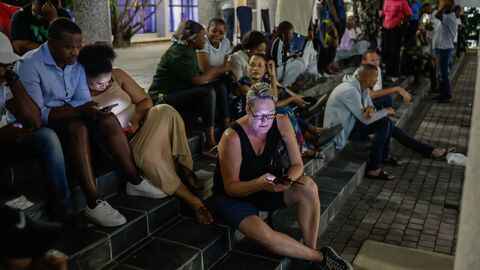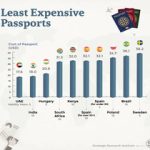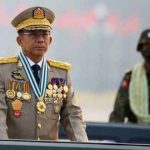Even though her party, the dominant South West Africa People’s Organization (SWAPO), is facing the most formidable challenge to its 34-year hold on power, the vote could usher in the country’s first female leader.
In crucial presidential and legislative elections, thousands of Namibians have been forced to wait in line for up to 12 hours due to logistical problems, with voting places remaining open for hours past their scheduled closing time.
On Wednesday, some voters told AFP that they had to wait in line all day, citing technical difficulties such as inadequate ballots and problems with voter ID tablets.
A 43-year-old farmer named Reagan Cooper, one of the about 100 voters outside the town hall polling station in the capital Windhoek, said, “It’s absolutely disappointing.”
“The voters have turned out, but the electoral commission has failed us,” Cooper stated to AFP.
Rakondjerua Kavari, the head of the ECN for the Windhoek region, claims that the Electoral Commission of Namibia extended voting hours for “no specified time” in response to objections from all political parties, including SWAPO.
Due to a shortage of ballots, voting was suspended for an hour at the Windhoek town hall location. Around 11:30 p.m., more seated, waking, and weary voters were welcomed with enthusiasm.
Vote counting started practically immediately after the final voter cast his ballot there, over four hours after the stated closing time of 9:00 p.m. (1900 GMT).
The election law of Namibia states that voters should be permitted to cast ballots if they are in line prior to the polls closing.
The ECN’s main officer, Petrus Shaama, stated that the organization had a duty to guarantee that voters could cast ballots.
However, the Independent Patriots for Change (IPC), the main opposition party, accused the ECN of being responsible for the long lineups and accused them of foul play.
“We have reason to believe that the ECN is deliberately suppressing voters and deliberately trying to frustrate voters from casting their vote,” said Christine Aochamus, president of the IPC.
Many Namibians waited for half the day to cast their ballots, equipped with umbrellas and folding chairs to deal with the long queues and intense heat.
Hundreds of people were still waiting in line at one polling place within the University of Science and Technology in Windhoek at 9:00 p.m., even though some had come an hour before polls opened at 6:00 a.m.
Polling station managers told AFP that issues with tablets that utilize fingerprints to verify voters’ identities included dead batteries, overheating, and delayed updates.
Joblessness
The incumbent vice president and candidate for SWAPO, Netumbo Nandi-Ndaitwah, urged Namibians “to come out in their numbers” and was among the first to cast their ballots.
In the thinly populated country, an estimated 1.5 million people were registered to vote.
Since bringing mineral-rich Namibia to independence from South Africa in 1990, SWAPO has held power, but grievances with persistent inequality and unemployment may push Nandi-Ndaitwah into a historic second round of elections.
In the 2019 elections, SWAPO leader Hage Geingob received 56 percent of the vote, while Itula, 67, received 29 percent. Given that Geingob, who passed away in February, had won about 87 percent five years prior, it was an impressive showing.
Although Namibia is a major exporter of diamonds and uranium, few of its almost three million citizens have benefited from this wealth.






